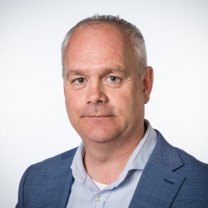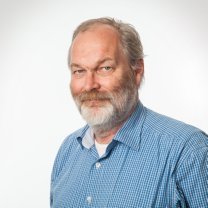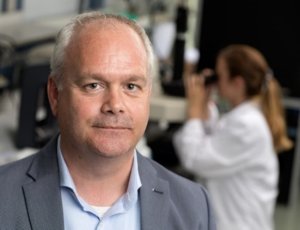“Without materials science, it would be darn empty around us.”
Text and interview: DBAR science writer & editor
Dutch version of this interview
Jilt Sietsma, Professor of Materials Science & Engineering (TU Delft), was one of the initiators of the 4TU Centre High-Tech Materials, leading it for the past seven years. On 1 January 2022, he will be succeeded by Arjan Mol, Professor of Corrosion Technology and Electrochemistry, who also works at TU Delft.
Jilt, did you have enough?
Jilt: "No, it was still fun. But in a year and a half I will be retiring, and the centre has just received a new mandate and funding for the period 2022-2025. So now is the right time for a fresh face with new ideas."
Arjan: "I owe a lot to the materials science ecosystem in the Netherlands. I would like to give something back. Not least for the future generations of materials scientists. We are faced with quite complex challenges; the better organised we are as the Dutch materials science community, the more society as a whole can benefit from our expertise."
How can 4TU.HTM contribute to meeting those challenges?
Jilt: “The 4TU.HTM centre can initiate or catalyse. We establish contacts between scientists. And as scientific director one can represent a large materials science community, which I did for the Groeifonds proposal Sustainable MaterialsNL, for example.”
How has the centre developed over the past years?
Jilt: “4TU.HTM has evolved considerably. Initially, it was a research centre that received two million euros, which yielded wonderful scientific results across the entire breadth of materials science. In addition, we were able to plant seeds that grew into large research programmes. Later, emphasis shifted to a network function. We must exercise humility: we are not in charge of materials science in the Netherlands, we operate alongside other partnerships. We succeeded in bringing people together through all kinds of activities such as workshops."
Arjan: “In recent years, we have increasingly realised that we cannot separate materials science from sustainable use and circularity. Our research is increasingly permeated with sustainability aspects. That’s a good thing. It is important that 4TU.HTM plays its role there, as well.”
Jilt: “Indeed. Some projects are specifically aimed at this, such as research into the recovery of raw materials. In others it is more indirect. When we develop new types of steel, for example, it is not useful to aim for scarce raw materials or processes that cost more energy or produce more CO2. Sustainability is a concern not just for us, but for all technological developments.”
Jilt: “A very nice initiative is the Sustainability Challenge that we are currently setting up. Multidisciplinary groups of 4-5 students from the four TUs work together to investigate a sustainability problem and jointly find solutions. We do this together with the 4TU centres in the fields of ethics and energy.”
Arjan, which points are you going to steal from Jilt and which things do you want to do differently?
Arjan: “I hope I can do it as well as Jilt, because his connective way of operating is impressive.”
Jilt: “You don't have to steal it, you get it for free!”
Arjan: “Of course I will also place emphasis on other aspects. I want to stand up for young scientists who have yet to build up their network. All around me I see that it isn’t easy for up-and-coming talent to form a broad network. This has become even more difficult due to the corona pandemic. Online conferences are great, they save a lot of travel time, but you only really make connections if you talk to each other at the bar after a presentation or during a poster session. That’s so important.”
Jilt: “I’m sure it will come back.”
Arjan: “Research has shown that the impact of corona on the work and well-being of scientists is significant. In the coming years we will discover what influence this has on the careers of the new generation of scientists. I’m passionate about making sure that they can make the necessary connections, within and outside their field of expertise.”
And towards the 'outside world'?
Arjan: "We need to work on public support using modern approaches. I also want to look closely at aspects such as diversity and inclusivity. Fully participating in a community is not self-evident for everyone. Are we involving everyone sufficiently?"
Jilt: “Arjan is much more outward-looking than I am. Don’t change that. I am more inclined to think and work quietly in my own room.”
Wasn't it time for a scientific director in a city other than Delft?
Arjan: “What Jilt has done so very well and I’ll try to do too is to represent all TUs. Hopefully it doesn't matter where I work in practice.”
Jilt: “Plus all TUs are represented in our management team.”
Arjan: “In the new year I will definitely make an introductory tour of the TUs to get to know everyone. Then I will undoubtedly hear all kinds of fresh ideas that I had not yet thought of.”
Jilt, do you have any advice for your successor?
Jilt: “4TU.HTM is not the most important platform for many people and does not have a bag of money to spend on research, so it will continue to require attention to activate and involve people. As scientific director, the collaboration with the coordinator of 4TU.HTM, Reina Boerrigter, is indispensable – without Reina everything would grind to a halt.”
What are you going to do with the time that has now become available?
Jilt: "I supervise several PhD students, which I am gradually phasing out. In addition, I have been working on a book for years, a foundational book on thermodynamics and kinetics in metals. I want to spend more time on that. But it won't be finished before my retirement, I'm afraid."
"Zonder materiaalkunde zou het verdomd leeg zijn om ons heen.
Tekst en interview: DBAR science writer & editor
Engelse versie van dit interview
Jilt Sietsma, hoogleraar Materials Science & Engineering (TU Delft), was een van de initiatiefnemers van het 4TU-centrum High-Tech Materials, en leidde het de afgelopen zeven jaar. Op 1 januari 2022 draagt hij het stokje over aan Arjan Mol, hoogleraar Corrosietechnologie en Elektrochemie, eveneens werkzaam aan de TU Delft.
Jilt, had je er genoeg van?
Jilt: “Nee hoor, het was nog steeds leuk. Maar over anderhalf jaar ga ik met pensioen, en het centrum heeft juist een nieuw mandaat en financiering ontvangen voor de periode 2022-2025. Nu is dus het goede moment voor een fris gezicht met nieuwe ideeën.”
Arjan: “Ik heb veel te danken aan het materiaalkundige ecosysteem in Nederland. Daar wil ik graag iets aan teruggeven. Niet het minst voor toekomstige generaties materiaalkundigen. We staan nogal voor complexe uitdagingen; hoe beter we als Nederlandse materiaalkunde georganiseerd zijn, hoe meer de hele maatschappij van onze expertise kan profiteren.”
Wat kan 4TU.HTM betekenen om die uitdagingen aan te gaan?
Jilt: “Het 4TU.HTM-centrum kan initiëren of versnellen. We leggen contacten tussen wetenschappers. En als wetenschappelijk directeur kun je een grote materiaalkundige gemeenschap vertegenwoordigen, wat ik bijvoorbeeld gedaan heb voor het Groeifondsvoorstel Duurzame MaterialenNL.”
Hoe heeft het centrum zich de afgelopen jaren ontwikkeld?
Jilt: “4TU.HTM heeft zich sterk geëvolueerd. In eerste instantie was het een onderzoekscentrum dat twee miljoen euro kreeg, wat prachtige wetenschappelijke resultaten heeft opgeleverd over de hele breedte van de materiaalkunde. Daarnaast hebben we zaadjes kunnen planten die later zijn uitgegroeid tot grote onderzoeksprogramma’s. Later verschoof de nadruk meer naar een netwerkfunctie. We moeten bescheiden zijn: we hebben niet de leiding over de materiaalkunde in Nederland, we functioneren naast andere samenwerkingsverbanden. Waar we goed in geslaagd zijn, is om mensen bij elkaar te brengen via allerlei activiteiten, zoals workshops."
Arjan: “De laatste jaren realiseren we ons steeds meer dat we materiaalkundige ontwikkelingen niet los kunnen zien van duurzaam gebruik en circulariteit. Ons onderzoek is steeds meer doordrenkt van duurzaamheidsaspecten. Dat is een goede zaak. Het is belangrijk dat ook 4TU.HTM daarin een rol speelt.”
Jilt: “Inderdaad. Sommige projecten zijn daar specifiek op gericht, zoals bijvoorbeeld onderzoek naar het herwinnen van grondstoffen. Bij andere speelt het indirecter mee. Als we nieuwe staalsoorten ontwikkelen dan is het bijvoorbeeld niet handig om te mikken op schaarse grondstoffen, of processen die meer energie kosten of meer CO2 produceren. Deze zorgen over duurzaamheid spelen niet alleen bij ons, maar bij alle technologische ontwikkelingen.”
Jilt: “Een heel leuk initiatief is de Sustainability Challenge die we nu aan het opzetten zijn. Multidisciplinaire groepen van 4-5 studenten van de vier TU’s gaan samenwerken om een duurzaamheidsprobleem te onderzoeken en samen oplossingen te vinden. We doen dit samen met de 4TU-centra op de gebieden van ethiek en energie.”
Arjan, welke punten ga je van Jilt stelen en welke zaken wil je anders gaan doen?
Arjan: “Ik hoop dat ik het net zo goed kan doen als Jilt, want de verbindende manier waarop hij opereert, is bewonderenswaardig.”
Jilt: “Je hoeft het niet te stelen, je krijgt het cadeau!”
Arjan: “Natuurlijk zal ik ook andere accenten leggen. Ik wil me hard maken voor jonge wetenschappers die hun netwerk nog moeten opbouwen. Ik zie om me heen dat het niet makkelijk is voor aanstormend talent om een breed netwerk te vormen. Dat is door de coronapandemie nog veel moeilijker geworden. Online conferenties zijn prima, ze schelen een hoop reistijd, maar je legt pas echt verbanden als je elkaar na een presentatie spreekt aan de bar of bij een postersessie. Dat is zo belangrijk.”
Jilt: “Dat gaat ook weer terugkomen, dat weet ik zeker.”
Arjan: “Onderzoek heeft laten zien dat de impact van corona op het werk en welzijn van wetenschappers groot is. Wat voor invloed dat heeft op de carrières van de nieuwe generatie wetenschappers zullen we de komende jaren merken. Ervoor zorgen dat zij toch de noodzakelijke verbindingen kunnen maken, binnen en buiten hun vakgebied, daar wil ik me voor inzetten, met liefde en plezier.”
En richting de ‘buitenwereld’?
Arjan: "We moeten met moderne benaderingen werken aan publiek draagvlak. Ook wil ik goed kijken naar aspecten als diversiteit en inclusiviteit. Volwaardig deelnemen aan een gemeenschap is niet voor iedereen vanzelfsprekend. Betrekken we iedereen er wel voldoende bij?"
Jilt: “Arjan is veel meer naar buiten gericht dan ik. Blijf dat vooral. Ik ben wat meer geneigd rustig op mijn eigen kamer na te denken en te werken.”
Was het niet tijd voor een wetenschappelijk directeur in een andere stad dan Delft?
Arjan: “Wat Jilt uitstekend heeft gedaan en ik ook hoop te doen, is om alle TU’s te vertegenwoordigen. Hopelijk maakt het in de praktijk niet uit waar ik zelf werk.”
Jilt: “En in ons managementteam zijn alle TU’s vertegenwoordigd.”
Arjan: “Ik ga in het nieuwe jaar zeker een introductietoer langs de TU’s maken om met iedereen kennis te maken. Dan hoor ik ongetwijfeld allemaal frisse ideeën waar ik nog niet aan gedacht had.”
Jilt, heb je nog een advies aan je opvolger?
Jilt: “4TU.HTM is voor veel mensen niet het belangrijkste platform en heeft geen zak met geld voor onderzoek, dus het zal aandacht blijven vereisen om mensen te activeren en erbij te betrekken. Als wetenschappelijk directeur is de samenwerking met de coördinator van 4TU.HTM, Reina Boerrigter, daarbij onmisbaar – zonder Reina ligt het helemaal op z’n gat.”
Wat ga je doen met de tijd die nu vrijkomt?
Jilt: “Ik begeleid nog een aantal promovendi, dat bouw ik langzaam af. Daarnaast ben ik al jaren bezig met een boek, een basisboek over thermodynamica en kinetiek in metalen, daar wil ik meer tijd aan besteden. Maar het zal niet afkomen voor mijn pensioen, ben ik bang.”








 Since 2017, Arjan Mol has been
Since 2017, Arjan Mol has been 





